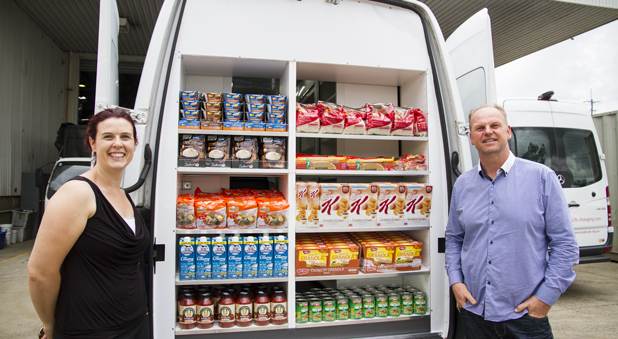Churches are responding positively to a new initiative by Anglicare to help provide food security for people on low incomes.
Anglicare’s Mobile Community Pantry had four churches signed up before its official launch late last month and now two more are ready to take part.
Under the new venture, a purpose-fitted van will visit a parish once a fortnight stocked with enough non-perishable groceries for about 50 people. Anglicare covers the cost of the van, driver and the food.
People on low incomes pay $10 to fill a shopping bag with pantry goods of their choice. A full bag contains $50 to $60 worth of goods. The church provides refreshments and at least five volunteers to welcome and assist people on the day.
“We don’t want people just to rock up, pay their few dollars and get their food and go,” says Anglicare’s partnership development manager, Matt Madigan. “We want to create a space where people can stop and stay and talk.”
Mr Madigan says the Mobile Community Pantry is the first in a range of measures Anglicare is developing to make it easier for churches to care for their community. “We are going to be rolling out a community visitation scheme as well, where we help the churches who would love to visit the socially isolated but need help with all the logistical, legal compliance-type things.”
He says this approach harnesses Anglicare’s expertise in the transactional side of projects to the church’s strengths in developing relationships and “connects the local church to the heart of what we do”.
Anglicare trialled the mobile pantry last year at All Saint’s, Petersham, where it ran alongside an existing food ministry called Hub of Hope, which offers a weekly lunch predominantly for the local boarding house community.
“Anglicare thought it fitted in quite well with their idea of food affordability and making it reach the right people in Sydney in the inner west, and from day one there was evidence that it was needed in the area,” says Hub of Hope director Matthew Nutt.
“Some people were worried that the van would be full of chips and not healthy food, but that isn’t the case.” Mr Nutt says 20 to 30 people have been visiting the pantry van regularly. “I think it’s been a really positive thing,” he says. “I’ve noticed extra people coming along, not just from the boarding house but from social housing.“We have met new people. We want to use food as a means to make connections with the community so it ties in beautifully with what we want to do.”
Dundas Anglican Church will begin offering the mobile pantry service at the end of this month.
Senior minister the Rev Alistair Seabrook says his congregation had been looking for an opportunity to reach the neighbourhood, which includes “families that are really doing it tough”. “The greatest need that people have is to come to know the Saviour, but as we meet the neighbours around us you can’t ignore the very practical and physical needs that they have,” he says.
“If we can show our love and our commitment to the local neighbourhood through the food pantry, then we can meet a felt need and build relationships so that we can talk to them about the Lord Jesus and the deeper need they don’t realise they have.”
Photo: Groceries to go: Anglicare’s partnership development manager Matt Madigan, and service leader for emergency relief Teresa Clark, with the new Mobile Pantry van.























